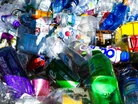Unilever: Global Plastics Treaty Needs Rules, not Guidance

Some of the biggest manufacturers in the world have lined up to demand definitive global plastics regulations as five weeks of negotiations comes to a close in South Korea.
These negotiations concern a UN treaty to end plastic pollution, held at the Intergovernmental Negotiating Committee-5 in Busan.
Unilever is among many manufacturers that are lobbying for strict regulation as opposed to voluntary guidelines.
“Fragmented, slow and costly… or coordinated, fast and cost effective? This is the choice governments have in Busan when they meet to finalise the plastics treaty at INC-5," says Unilever CEO Hein Schumacher.
“Either a voluntary treaty that will lead to further regulatory fragmentation, causing additional cost and complexity to business.
"Or a treaty underpinned by global rules – one that harmonises regulations and supports business to unlock solutions to plastic pollution at the scale and speed we urgently require.
“Business needs global rules.”
A ‘once in a generation’ opportunity
Unilever has been amongst the most vocal manufacturers when it comes to the treaty.
The company urges governments to agree to a “legally binding treaty – underpinned by global rules – that covers the entire lifecycle of plastic products”.
It adds: “This will avoid the current disconnected national efforts and create a level playing field across the global economy.
In addition to Unilever a host of other manufacturers and global companies have signed a letter to the UN.
The letter calls for the following in the Global Plastics Treaty:
- Global criteria and lists that enable the restriction and phase out of chemicals of concern as well as problematic and avoidable plastic products
- Sector-specific approaches and global criteria for circular product design of plastic products, such as packaging
- Common definitions and key principles for the effective implementation of Extended Producer Responsibility (EPR) schemes
- A strong mandate for the governing body to strengthen the agreement over time.
How close are we to a deal?
At the UN Environment Assembly in 2022, 175 countries agreed to begin negotiations on a UN treaty to end plastic pollution.
If original aims are met the text of the treaty should be finalised this year.
Unilever says that creating this treaty is vital.
“A treaty would help simplify supply chains, scale existing solutions and spur further innovation," the organisation states.
“Voluntary initiatives alone aren’t enough. More interventions are needed across the full lifecycle of plastic: both upstream (for example, raw material extraction and production) and downstream (segregation, collection, sorting, recycling and disposal).
“Voluntary initiatives also distort the market because they often lead to higher costs. This means that companies taking action are at a competitive disadvantage compared to those not taking action.”
Unilever goes on to state that a voluntary treaty would not only be ineffective but actively harmful to global plastics reduction.
“A treaty based on voluntary measures alone risks delaying action by decades," the company says.
“This would create further fragmentation in the regulatory landscape for business, leading to increased cost and complexity.
" As business leaders, we are working to transform our business models to catalyse a circular economy in which plastic never becomes waste or pollution, and the value of products and materials is retained in the economy.”
Lobbying by letter
Unilever co-chairs the Business Coalition for a Global Plastics Treaty which aims to give confidence to governments that businesses and financial institutions want harmonised global rules and regulations.
Members of the Coalition, a group of 250+ global businesses, financial institutions and NGOs, wrote to world leaders ahead of the summit.
Signatories include:
- Antoine de Saint-Affrique, CEO, Danone
- Augusto Bauer, CEO, AJE
- Barbara Martin Coppola, CEO, DECATHLON
- Carsten Knobel, CEO, Henkel
- Christian Klein, CEO, SAP
- Fisk Johnson, CEO, SC Johnson
- Hein Schumacher, CEO, Unilever
- Jon Abrahamsson Ring, CEO, Inter IKEA Group
- Kevin Kwilinski, CEO, Berry Global
- Laurent Freixe, CEO, Nestlé
- Magnus Groth, CEO, Essity
- Peter Konieczny, CEO, Amcor
- Philipp Lehner, CEO, ALPLA
- Poul Weihrauch, CEO, Mars Inc
- Ramon Laguarta, CEO, PepsiCo
- Rodrigo Tona, CEO, Ternova
- Samuel Sigrist, CEO, SIG
- Stefan Doboczky, CEO Borealis
- Surendra Patawari, Chairman, Gemini Corporation
- Tom Daunt, Member of Executive Board, ALDI SOUTH Group
- Tom Szaky, CEO, Terracycle
- Tove Andersen, CEO, Tomra
Explore the latest edition of Manufacturing Digital and be part of the conversation at our global conference series, Manufacturing LIVE.
Discover all our upcoming events and secure your tickets today.
Manufacturing Digital is a BizClik brand.
- Manufacturing Unwrapped: Inside IKEA, The Wonderful EverydayProduction & Operations
- Unilever Speaks on Failure of Global Plastics TreatySustainability & ESG
- The Breakdown of the Global Plastics Treaty isn't the endSustainability & ESG
- Amcor & Power Roll: Pioneering Solar Photovoltaic FilmSustainability & ESG


